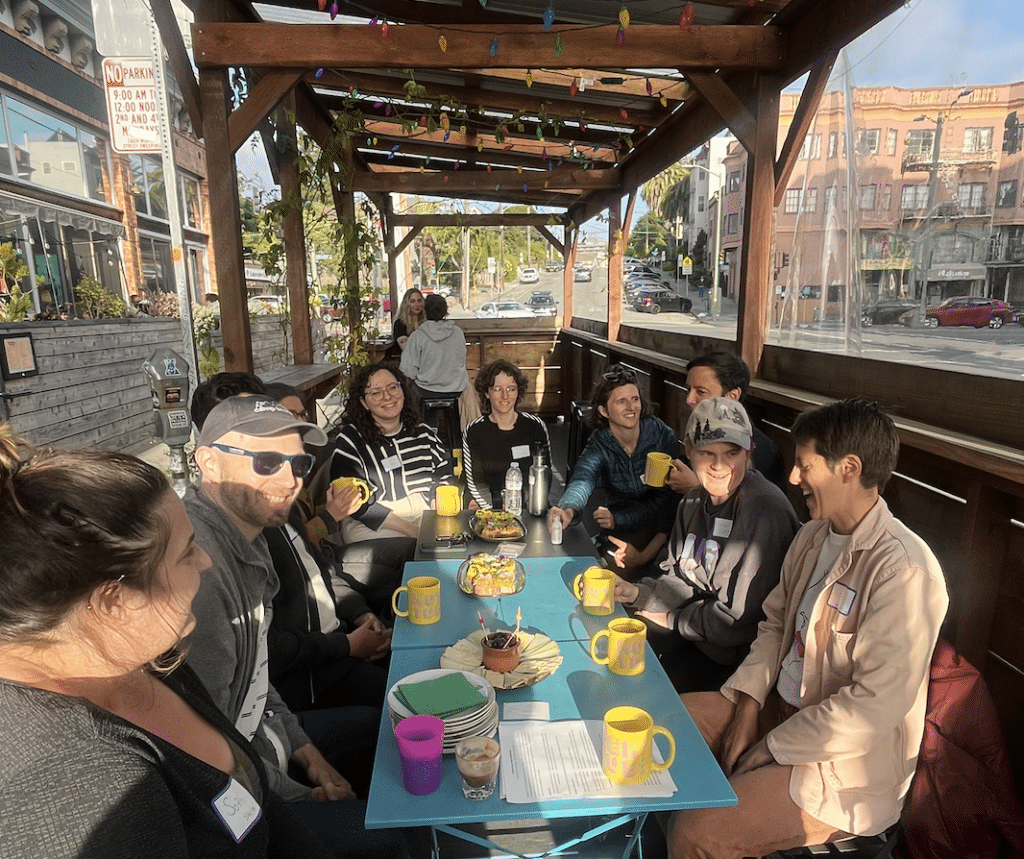

Bringing Our Curiosity to the Table
This piece is an introduction to our forthcoming series on ritual. Stay tuned for more later this summer. Curious to talk about any of the ideas here? We’re always available for coffee!
How can Jewish learning be a ritual in and of itself? When the Torah mentions ‘holiness,’ what does that really mean? How do we each relate to something bigger than ourselves?

We considered the imprecision of translation and how “holiness” shows up in Torah with different associations than it shows up in English. We talked about how all of us relate differently to something bigger than ourselves, and how that affects our understanding of holiness.
We didn’t all agree, but we approached our places of difference with openness and curiosity, aware that the range of opinions are exactly what makes learning together so valuable.
Can learning be a sacred practice?
There’s a long history of understanding learning as a sacred practice, which we see in the Mishnah. Mishnah is the legal code where the ancient rabbis work out on the page what it might look like to take the tradition they inherited and transform it into the version of Judaism we inhabit today.
Rabbi Halafta teaches (in Mishnah Avot 3:6) that not only can we learn about the sacred—our learning itself is a sacred practice.
When ten sit together and occupy themselves with Torah, the Shechina (Divine presence) dwells among them.
In this teaching, Rabbi Halafta asserts the inherent holiness of shared learning. Even if our group at Torah study was, in a literal sense, just sitting around a table, eating snacks and chatting, there was also something bigger going on.
The practice of study was connecting us to the generations before us who have engaged in similar study, and to the mysteries of our universe, beyond anything we can understand or articulate.
Rabbi Halafta then goes on to name progressively smaller groups of people learning Torah, asserting that the Divine presence is among them, and citing verses of scripture as support. Finally, the text asks:
How do we know that the same is true [that the Shechina is present with] even of one [person learning Torah on their own]? As it is said: “In every place where I cause my name to be mentioned I will come to you and bless you” (Exodus 20:21).
The first time I read this text, I was struck by this image—every time I engage in the practice of Jewish learning, even if I am alone, I am never actually alone.
How to tap into ritual?
But knowing something isn’t the same as experiencing it. In the shuffle of daily life, it can be hard to land in moments of sacred practice. This is one place that a community—or even just a group of friends—can come in. Even if I know that studying alone can be as holy as doing it with others, it’s much more challenging to stick to something I’m doing solo. If I’ve signed up for a class or committed to learning with a friend, I’m much more likely to follow through.
Our team at GatherBay started thinking about this concept several months ago, when we facilitated a cohort called Big Jewish Questions: Ritual Edition. We explored how a group of people can come together to both learn about ritual, as well as do ritual together. We gathered at the same time, in the same place, for four weeknights, and each person piloted a new ritual in their life.
We learned together, looking at Torah and Talmud, as well as poems and essays, to inform our ritual practices. Learning is only one of Judaism’s many ritual technologies for tapping into an experience of being part of something bigger than ourselves—whether that’s a community, a sense of the divine, or something else entirely.
So what’s next?
We heard from folks that they were curious to learn more about ritual, so we wanted to make some of the ideas from the cohort more widely available. To learn more, stay tuned for GatherBay’s upcoming blog series on ritual—we’ll share the first installment in mid-June.
We always appreciate hearing what the community needs, so let us know what you’re curious about! You never know when what you’re wondering about will turn out to be the topic of a future blog post or cohort.
*
Rabbi Gray Myrseth is GatherBay’s Community Rabbi. Originally from San Francisco, Gray was ordained at the Hebrew College Rabbinical School of Newton, MA, and has worked as a rabbi, chaplain, and educator with people of all ages, within Jewish institutions and beyond. When not at work, they can be found making ceramic Judaica, writing and reading poetry, expounding on the wonders of Talmud study, and enthusiastically exchanging podcast recommendations.

